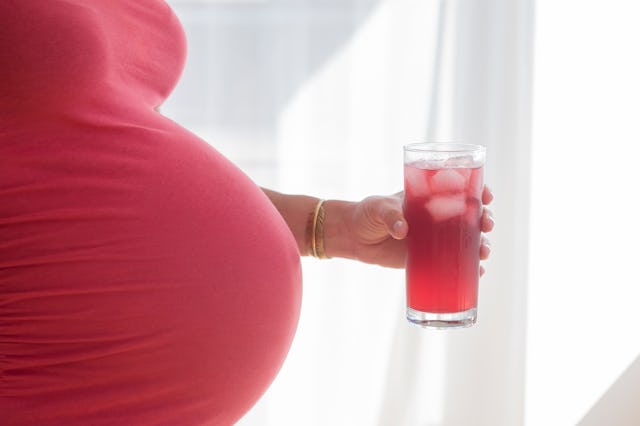Preggers & Eating Ice Like There's No Tomorrow? What An OB-GYN Says About This Craving
According to Dr. Jessica Shepherd, you’re probably fine — but there are a few red flags you should know about.

If asked to make a list of things synonymous with pregnancy, your list may look a little like this: joy, excitement, nesting, heartburn, cravings, cravings, and more cravings! Yep, all those pregnancy hormones really ramp up the senses, making smell and taste (and texture) the basis for many pregnant people’s cravings, or aversions for that matter. And among the list of the most common cravings — including pickles and ice cream, of course — is, surprisingly, eating ice while pregnant. So what's the deal with pregnancy cravings, and why is ice calling the names of pregnant people everywhere?
According to Jessica Shepherd, MD, Chief Medical Officer at Verywell, "Pregnancy cravings can be caused by a few things, with hormonal changes being one of the main factors, mainly progesterone. Hormone changes can affect [the] sensory experience of food, smell, and mood, which can all lead to cravings for certain foods. Many pregnant people report having a heightened sense of smell during pregnancy which can make certain smells more or less appealing, which in turn can affect what they choose to eat."
OK, so this all makes sense so far, right? And, pregnant or not, it's likely that the wafting smell of a freshly baked triple-layer chocolate cake would lure just about anyone. For a pregnant person with an increased sense of smell and unstoppable desire, nothing will stand in the way. But these intense cravings don't just come in the form of sweets.
Why do we crave ice during pregnancy?
As mentioned, ice is just one of the common cravings expectant moms experience. That may seem odd given that ice has relatively no smell or taste — things typically associated with other cravings — but a deeper look at the increased physical and nutritional needs that occur during pregnancy may hold the clues to why crunching on ice is pretty much a pregnancy pastime.
Shepherd pointed to two factors when asked why people often crave ice during pregnancy: anemia and dehydration. She explains, "Pregnant people are at a higher risk of becoming anemic due to the demands of blood supply and circulation which can cause an iron deficiency which has been known to lead to increased cravings for ice, also known as pica." Additionally, Shepherd says, "Due to the changes in the body during [pregnancy], many experience dehydration from morning sickness or elevated body heat, which can make chewing ice appealing.”
Is crunching on ice during pregnancy safe?
While there are many things that pregnant expectant people should avoid (including certain pain relievers), eating ice while pregnant isn't usually one of them. In fact, Shepherd reassured us that craving or chewing ice is not a cause for immediate concern and, in most cases, is completely harmless. Though, she cautioned that when cravings expand into non-food items, such as laundry detergent, or even baking soda, it could be a sign of more significant nutritional deficiencies, making it a good idea to speak with a doctor.
Since ice cravings are believed to be rooted in those same deficiencies that cause non-food cravings, Shepherd says that treating those may also help ward off high cravings for ice. She emphasizes, "Pregnant people should continue to eat a well-balanced diet to keep themselves and their growing baby healthy; if they're eating ice in addition to this, there is no harm, but generally, ice shouldn't be a substitute for proper nutrition."
So, until chewing ice points to nutritional deficiencies, becomes a problem for your overall health (think chipped teeth!), or a craving for a side of laundry detergent sets in, it looks like eating ice while pregnant is likely to be safe and an urge you can indulge.
Expert Source:
Jessica Shepherd, MD, Chief Medical Officer at Verywell
This article was originally published on